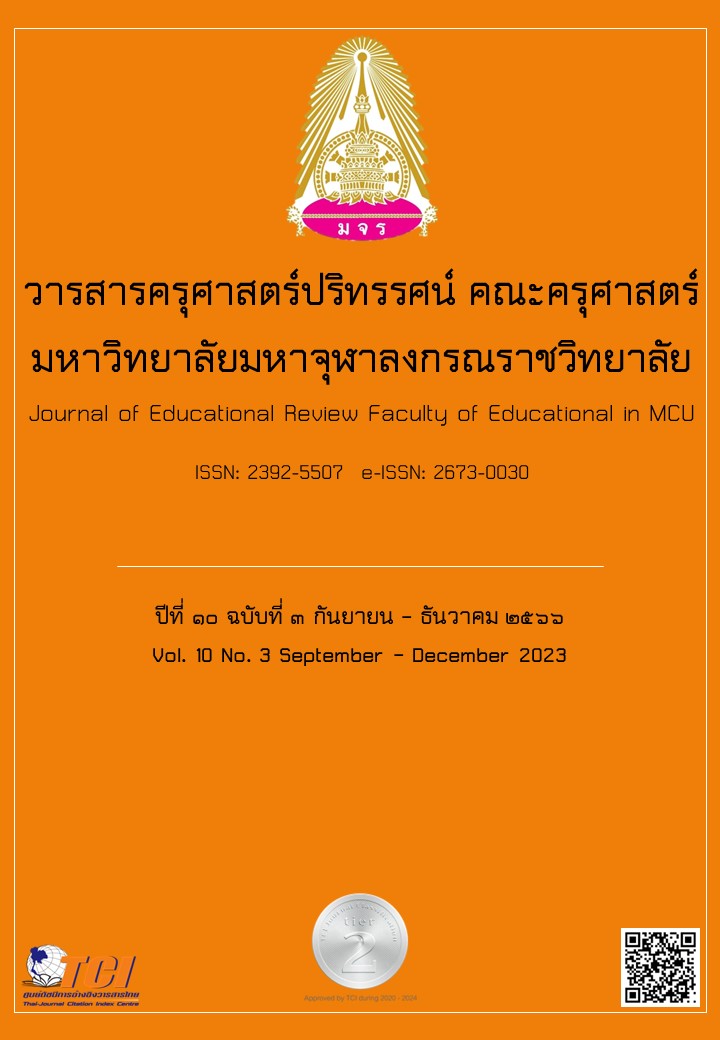INVESTIGATING THE EDUCATIONAL QUALITY MANAGEMENT OF XUANCHENG ELECTROMECHANICAL COLLEGE, CHINA
Main Article Content
Abstract
The objective of this research were: 1) To explore the problems and needs of educational quality management in Xuancheng Electromechanical College. 2) To establish guidelines for quality management of Xuancheng Electromechanical College. The sample groups of 28 administrators, 210 teachers and 79 office clerks were surveyed. The stratified random sampling technique is used to sample the entire population. The research instruments were questionnaires and set of questions for focus group discussion and In-depth interviews. The statistics were used for analyzing data including frequencies, percentages, means, and standard deviations. The results of this paper shown that Xuancheng Electromechanical College the quality system, evaluation and inspection mechanism, feedback mechanism, staff training and improvement plan, overall, the perspectives of problems and needs are at the highest level. The guideline for quality management in Xuancheng Electromechanical College was constructed, encompassing the following: a) Improve the quality system. b) improve the evaluation and inspection mechanism. 1) Evaluate objectives and criteria. 2) Evaluate indicators and content. 3) Evaluate methods and tools. 4) Evaluate results and grades. c) Establish a sound feedback mechanism. 1) Purpose of feedback. 2) Principles that should be followed for feedback. 3) Form of feedback. 4) Feedback channels. d) Staff training and improving plan. 1) Training objectives. 2) Training program. 3) Training effect evaluation. 4) Retraining program. The main research results of this paper were as follows: a) Educational administrators should have staff training and improvement plan. b) educational institution administrators should improve the quality system, Ensure sustainable improvement of education quality management. c) educational institution administrators should improve the evaluation and inspection mechanism and institutionalized management. d)Educational institution administrators should establish a sound feedback mechanism so that the inspection results can be processed quickly and effectively.
Article Details

This work is licensed under a Creative Commons Attribution-NonCommercial-NoDerivatives 4.0 International License.
ทัศนะและความคิดเห็นที่ปรากฏในบทความในวารสารฉบับนี้ถือเป็นความรับผิดชอบของผู้เขียนบทความนั้นเพียงผู้เดียว และไม่ถือเป็นทัศนะและความรับผิดชอบของกองบรรณาธิการ
กองบรรณาธิการขอสงวนสิทธิ์ในการคัดเลือกบทความลงตีพิมพ์และจะแจ้งให้เจ้าของบทความทราบหลังจากผู้ประเมินบทความตรวจอ่านบทความแล้ว
ต้นฉบับที่ได้รับการตีพิมพ์ในวารสารครุศาสตร์ปริทรรศน์ คณะครุศาสตร์ มหาวิทยาลัยมหาจุฬาลงกรณราชวิทยาลัย ถือเป็นกรรมสิทธิ์ของคณะครุศาสตร์ มหาวิทยาลัยมหาจุฬาลงกรณราชวิทยาลัย ห้ามนำข้อความทั้งหมดหรือบางส่วนไปพิมพ์ซ้ำ เว้นเสียแต่ว่าจะได้รับอนุญาตจากมหาวิทยาลัยฯ เป็นลายลักษณ์อักษร
References
Díez, F., Villa, A., López, A. L., & Iraurgi, I. (2020). Impact of quality management systems in the performance of educational centers: educational policies and management processes. Heliyon. 6(4). doi:10.1016/j.heliyon.2020.e03824.
Girmanová, L., Šolc, M., Blaško, P., & Petrík, J. (2022). Quality Management System in Education: Application of Quality Management Models in Educational Organization—Case Study from the Slovak Republic. Standards. 2(4). 460-473. doi:10.3390/standards2040031.
He, T. (2022). A Multiobjective Allocation Method for High-Quality Higher Education Resources Based on Cellular Genetic Algorithm. Mathematical Problems in Engineering. 2022(1). 1-8. doi:10.1155/2022/4322078.
Kholis, N., Supriyadi, E., & Mardapi, D. (2021). Important Ways in Designing Vocational Secondary School Teacher Development Education and Training. Journal of Physics: Conference Series. 1737(1). doi:10.1088/1742-6596/1737/1/012036.
Ni, H., & Ye, Y. (2018). Entrepreneurship education matters: exploring secondary vocational school students’ entrepreneurial intention in China. The Asia-Pacific Education Researcher. 27. 409-418. doi: 10.1007/s40299-018-0399-9.
Placklé, I., Könings, K. D., Struyven, K., Libotton, A., van Merriënboer, J. J., & Engels, N. (2020). Powerful learning environments in secondary vocational education: towards a shared understanding. European journal of teacher education. 43(2). 224-242. doi:10.1080/02619768.2019.1681965.
Sherstobitova, A. A., & Iskoskov, M. O. (2020). The role of quality management systems for educational institutions in the digital economy. IOP Conference Series: Materials Science and Engineering. 986. doi:10.1088/1757-899X/986/1/012023.
Srisaat, B. (2002). Preliminary research. 7th ed. Bangkok: Suwiriyasan.
Yamane, T. (1973). Statistics: An Introductory Analysis. London: John Weather Hill, Inc.


